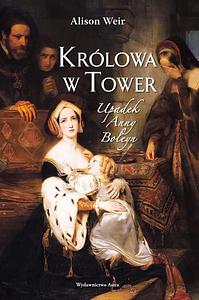Take a photo of a barcode or cover
I can't explain it but I love the story of Anne Boleyn. A good biography that asks the questions readers want to ask.
challenging
informative
reflective
slow-paced
I really enjoyed this book! Normally being a historical fiction person, this was a new style for me. And the only reason I couldn't give it 5 stars is because I felt that Weir jumps back and forth too much. Granted, she was pulling in all the views from her research, but sometimes I had to go back and read passages 3 and 4 times because the jump from this to that was so sudden. All in all, the information was interesting and really changed my view of the whole Anne Boleyn fiasco. Would definitely recommend
informative
reflective
tense
slow-paced
5 stars for content and author's chops at navigating and documenting the history, but only 3 overall as i never fully engaged with this book.
I'm consistently fascinated by the rumor and mystery and romanticism surrounding the death of Anne Boleyn; I found this biography comfortably written, objective and informative, and very enjoyable--despite how it ends.
3.5 stars. I can’t quite remember where my fascination with Anne Boleyn began but when I was about 18 in first year university, we had to do a presentation on someone we admired. I did mine on Anne Boleyn which was strange given I was doing a business degree! But I had students come up to me asking who this woman was and wanting more information which demonstrated to me that history is not dry, but rather dramatic and intriguing.
I’ve read a lot about Anne Boleyn and this book focuses on the last 4 months of her life. For that reason, if you aren’t familiar with Anne Boleyn, I would recommend reading other books about her.
I used to LOVE Alison Weir's books and read everything she wrote but now I don’t enjoy them as much. I can see her bias and use of sources that she says are unreliable but she will use them at other times depending on her theories. I don’t agree with her view in this book that Henry VIII wasn’t to blame, and it was a conspiracy of Cromwell and the Seymour’s alone. With Henry’s personality and actions, I believe he must have had some involvement in Anne’s downfall.
There is a lot of detail in this book, which at times was dry and repetitive but overall, I think this was a well-written book. And history would have been different if Kathryn had had a living son. Henry would have never divorced her. And Anne – if she gave Henry the much-needed son, it would have been a love story for the ages. I don’t think we would be fascinated with these women today without this “drama”. It is a tragedy for these real women but if they had had sons, they would have been like other English queen’s (just a foot-note in history).
I’ve read a lot about Anne Boleyn and this book focuses on the last 4 months of her life. For that reason, if you aren’t familiar with Anne Boleyn, I would recommend reading other books about her.
I used to LOVE Alison Weir's books and read everything she wrote but now I don’t enjoy them as much. I can see her bias and use of sources that she says are unreliable but she will use them at other times depending on her theories. I don’t agree with her view in this book that Henry VIII wasn’t to blame, and it was a conspiracy of Cromwell and the Seymour’s alone. With Henry’s personality and actions, I believe he must have had some involvement in Anne’s downfall.
There is a lot of detail in this book, which at times was dry and repetitive but overall, I think this was a well-written book. And history would have been different if Kathryn had had a living son. Henry would have never divorced her. And Anne – if she gave Henry the much-needed son, it would have been a love story for the ages. I don’t think we would be fascinated with these women today without this “drama”. It is a tragedy for these real women but if they had had sons, they would have been like other English queen’s (just a foot-note in history).
The information provided in the book was very interesting but I didn't realize going in that the book would be quite so "textbook like". It is clear the author did a world of research. I did enjoy it.
"There had been no precedent for the trial and execution of an English queen, and Anne Boleyn's fall, with its attendant purge of the Privy Chamber, had been nothing less than sensational. At a stroke, Cromwell had eliminated or neutralized a whole faction, and many were touched by the tragedy." (291).
I wanted to read this book for a long time. Anne Boleyn's downfall from the Queen of England to a decapitated lady on the sword stood out in history. I actually don't remember how it became a huge spark in my mind, but it really stood out, especially with the notoriety it holds up to this day. And even after I started reading it...it took a while to get into it.
Alison Weir sets the stage considering the circumstances of Anne Boleyn's downfall: compared to Katherine of Aragon, who was very beloved even upon her death, Anne had little to no allies to back up her cause, and was reviled by the public. Combined with her increasing inability to bear sons (climaxing in a miscarriage just after Katherine of Aragon's death) and Henry VIII's jousting incident, it seems that Anne was executed because Henry was tired of her. Weir examines this interpretation, then goes over to subvert it by saying that Anne was framed of her crimes, minimizing Henry's interest in Jane Seymour as a pivotal role.
Speaking of which, one thing which stood out was how Weir mentions the shifting chessboard of England in context for Anne's downfall. She specifically mentions Cromwell's role in Anne's fall, not only with the frustration on alliances, but also how they diverged with religion. "In defying him, and in rexerting her influence over the King, she showed herself to be an obstacle that needed to be removed" (73) This was something I never learned about before--like a lot of people, I didn't fully recognize the full extent of political intrigue which was going on. Simultaneously, I felt like I wanted to know more about it, as I felt lost along the way, though there were days I went without reading the book. Maybe I should read a biography of Anne Boleyn?
Like with Weir's historical fiction novels, you could tell she provides a lof of information with her case, delving into the political climate of Tudor England up to those momentous months in 1536. She really uses her primary sources well, even poems which were composed during that time, which adds more color to what would otherwise be an equivalent of a political drama or what I would imagine a true crime novel. I appreciate how she goes into how she delves into the accuracy of said works. One intriguing one was a letter deemed from "The Lady in the Tower", namely Anne Boleyn, but was dotted with holes in terms of whether or not it was accurate.
I came into the book presuming that Anne was innocent, and Weir doesn't stray from that narrative. However, she notes this was a miscarriage of justice, something which wouldn't be fully grasped upon until after Anne's death, after revealing a number of inconsistencies. I think it also opens up to the mythology written about Anne Boleyn in the centuries afterwards, frequently adding a mix of prejudice when analyzing her. Talking about the impact on Elizabeth I also strengthens the book, as it was more than just a moment.
I see the events leading to the fall of Anne Boleyn playing out like what we would call "the trial of the century" events we see on TV. And I am also curious about what if somebody like her were put on the stand in the social media age, where we not only have better knowledge of the justice system, but also a bigger audience to pry on the public mood on Anne Boleyn. It's eerily fascinating, and yet, tragic. "The Lady in the Tower" not only delves into the gritty details on this miscarriage of justice, but also on the ripple effect on Europe. And it is well done, albeit for those who need to go really deep into it. (7.5/10)
I wanted to read this book for a long time. Anne Boleyn's downfall from the Queen of England to a decapitated lady on the sword stood out in history. I actually don't remember how it became a huge spark in my mind, but it really stood out, especially with the notoriety it holds up to this day. And even after I started reading it...it took a while to get into it.
Alison Weir sets the stage considering the circumstances of Anne Boleyn's downfall: compared to Katherine of Aragon, who was very beloved even upon her death, Anne had little to no allies to back up her cause, and was reviled by the public. Combined with her increasing inability to bear sons (climaxing in a miscarriage just after Katherine of Aragon's death) and Henry VIII's jousting incident, it seems that Anne was executed because Henry was tired of her. Weir examines this interpretation, then goes over to subvert it by saying that Anne was framed of her crimes, minimizing Henry's interest in Jane Seymour as a pivotal role.
Speaking of which, one thing which stood out was how Weir mentions the shifting chessboard of England in context for Anne's downfall. She specifically mentions Cromwell's role in Anne's fall, not only with the frustration on alliances, but also how they diverged with religion. "In defying him, and in rexerting her influence over the King, she showed herself to be an obstacle that needed to be removed" (73) This was something I never learned about before--like a lot of people, I didn't fully recognize the full extent of political intrigue which was going on. Simultaneously, I felt like I wanted to know more about it, as I felt lost along the way, though there were days I went without reading the book. Maybe I should read a biography of Anne Boleyn?
Like with Weir's historical fiction novels, you could tell she provides a lof of information with her case, delving into the political climate of Tudor England up to those momentous months in 1536. She really uses her primary sources well, even poems which were composed during that time, which adds more color to what would otherwise be an equivalent of a political drama or what I would imagine a true crime novel. I appreciate how she goes into how she delves into the accuracy of said works. One intriguing one was a letter deemed from "The Lady in the Tower", namely Anne Boleyn, but was dotted with holes in terms of whether or not it was accurate.
I came into the book presuming that Anne was innocent, and Weir doesn't stray from that narrative. However, she notes this was a miscarriage of justice, something which wouldn't be fully grasped upon until after Anne's death, after revealing a number of inconsistencies. I think it also opens up to the mythology written about Anne Boleyn in the centuries afterwards, frequently adding a mix of prejudice when analyzing her. Talking about the impact on Elizabeth I also strengthens the book, as it was more than just a moment.
I see the events leading to the fall of Anne Boleyn playing out like what we would call "the trial of the century" events we see on TV. And I am also curious about what if somebody like her were put on the stand in the social media age, where we not only have better knowledge of the justice system, but also a bigger audience to pry on the public mood on Anne Boleyn. It's eerily fascinating, and yet, tragic. "The Lady in the Tower" not only delves into the gritty details on this miscarriage of justice, but also on the ripple effect on Europe. And it is well done, albeit for those who need to go really deep into it. (7.5/10)




